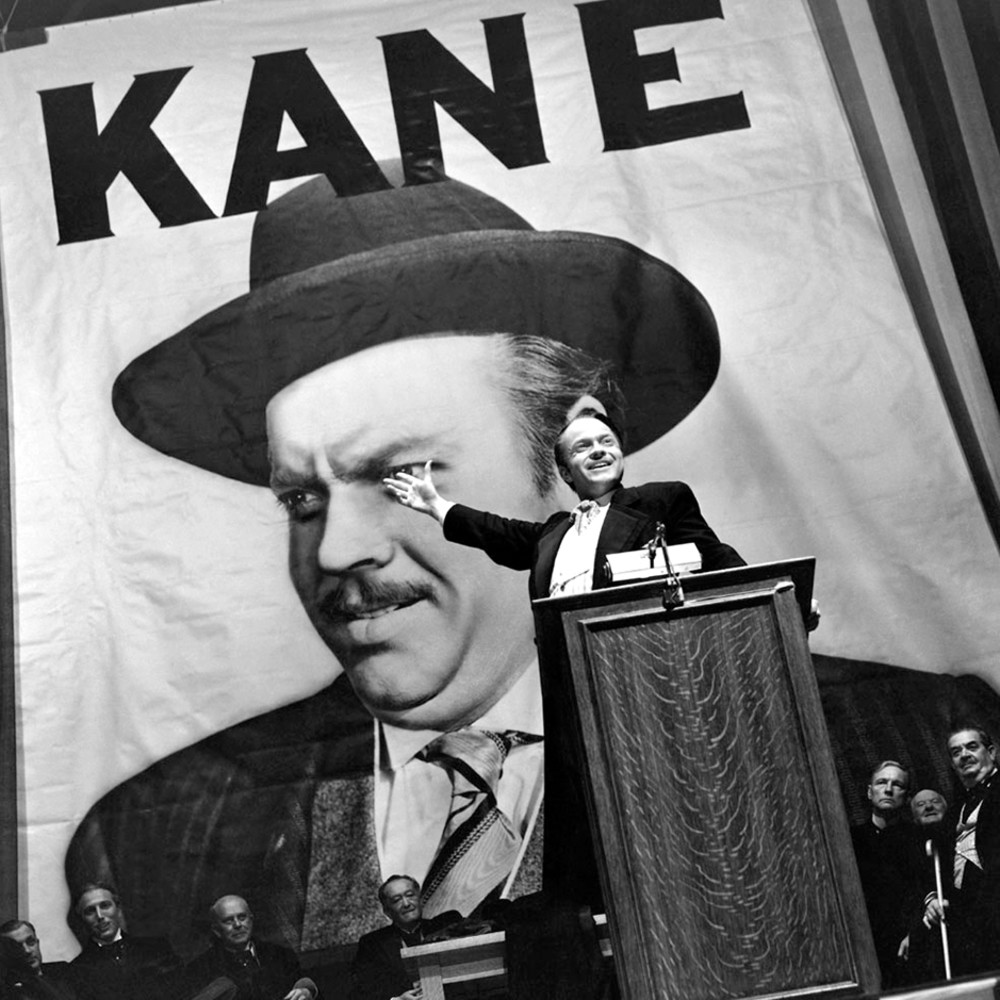Genre: Krimi
GoodReads meta-data is 328 pages, rated 3.6 by 1004 litizens
Verdict: Read all about it!
Capability Weeks, a young woman of nineteen, works for the editor of the Ladies’ Page on the stuffy and staid New York ‘Sentinel’ newspaper in 1915. She and her father, Julian, have only recently returned to the States after decades abroad in Europe and Asia. That experience gives her the caché to land the newspaper job but leaves her unprepared for the manners and mores of the time and place. Though the pair are comfortably well off, Mr Weeks grudging approves of Capability’s work, provided it in no way interferes with her home duties, which fall to her because her mother and his wife died years ago. Later in the book, this need to run the home comes into conflict with her journalistic ambitions.
It was a time of breakneck economic growth, raging war in Europe, submarine attacks in the Atlantic, and a tsunami of immigrants. A volatile mix in the making.
Because it is new to her, Capability observes New York City and its denizens with interest, the skyscrapers, the wind tunnel streets, the underground subway, the class snobbery, the social distance between classes, the profusion of newspapers. All of this brought to the mind the two great chroniclers of the Gilded Age (1880-1917), as the period was later called, Henry James and Edith Wharton, and Capability is no match for either of them. It was a time of rapid economic growth that promised to go on forever, with it streamed millions of immigrants arriving at this new Eden every year. At the same time stupendous wealth was concentrated in the railway and banking barons, a few of whom appear in these pages. (Aside, one of these lesser magnates endowed Duke University where the author of this book obtained a PhD.)
One day the Ladies’ Page editor is indisposed, and sends this ingenue in her place to an elaborate garden party with Japanese daytime fireworks. (A new idea to me which is fully explained in a Wikipedia entry.) While passing among the great and the (not so) good at the party Capability studies them, and has an unpleasant encounter with the penniless scion of a once great fortune, Hunter Cole and his burlesque dancer wife. Capability and the wife hit if off, both being fish out of water in this set. Cole is a rude and crude bore, despite his illustrious forbears. Think of a radio shock jock and there you have him. Seasoned krimi readers will have no trouble in picking him as the first to go, and he does — good riddance — during the fireworks display. Capability may have been the last to see him alive and the first to see him dead.
Because she was there the newspaper editor reluctantly assigns her to assist the male journalist covering murder, but in a very circumscribed role suitable for a woman. She chaffs at that, the more so when she sees how superficial the male journalist approaches the subject. (Ahem, what’s new.)
However the police investigation applies the standard operating procedure of the time and blames Hillary Clinton. (Just joking to see if the reader is paying attention.) No the SOP is to find the nearest immigrant who barely speaks English, in this case an Italian stable hand, and pin the crime on him and beat a confession out of him. This satisfies the police and the journalist, but Capability finds it a long bow.
The book is rich in the detail of life in that rarefied stratum, time, and place, which is seen afresh, if not with the wit and insight of James or Wharton. For example, Capability is assigned an interview with Miss Anne Morgan (yes, of that Morgan family) about her book ’The American Girl: Her Education, Her Responsibility, Her Recreation’ (1915) who like a Hollywood star today displays celebrity compassion for working women. However Capability and this reader, too, found Miss Morgan to be streets ahead of them. That was refreshing. In so many krimi writers there is the ambition to write social criticism by portraying others, especially the rich, the famous, the successful, as grasping dunderheads and imbeciles. Not so here. Miss Morgan knows herself, including her own blind spots. Woe to a journalist who tries to trip her up.
Likewise Capability’s chance encounter with a German diplomat is very well presented. He may be up to shady things but he is no cardboard stereotype, and when called to account for his actions, makes a cogent statement.
Another compensation is the broader canvas the novel offers, no character in a James or Wharton book ever spoke to a stable hand, an Italian immigrant, or visited the Tombs (if one does not know what this is, look it up because it still exists, or did when I saw it in 1980).
In this era everyone is addressed in every exchange by title, thus ‘Miss Weeks.’ While I am sure that is accurate, it is tedious to read, like those rituals of formality that plump up Alexander McCall Smith’s slender stories. The constraints on women are many and they are made apparent but not to a didactic drumbeat of hindsight such as is found in other krimis that want to offer a discounted, hindsight social criticism, i.e., for the author to display peacock feathers of virtue.
The author distinguishes characters, offers their distinct perspectives, and steers on without losing focus. This is the first in a series.

Radha Vatsai
Bones to pick, I have a few, somewhere along the way Capability becomes Kitty to friends and family. Yes, the name does refer to the gardener though why did not register with me.
‘Flight to Arras’ (1942)
‘Pilote de guerre’ (1942), translated as ’Flight to Arras’ (1942) by Antoine de Saint Exupéry
Good Reads meta-data is 168 pages, rated 3.9 by 1852 litizens.
Genre: Non-Fiction
Verdict: ‘Like glasses of water thrown onto a raging forrest fire,’ that is St X’s description of the futile and pointless actions of his Reconnaissance Group II/33 in May and June 1940 when half of the planes (seventeen in all) and crew (more than fifty men) were sacrificed in meaningless and often fatal efforts to stem the blaze that erupted from the impassable Ardenne.
Somehow St X and the other half of Group II/33 survived. He flew at least six combat missions at five hundred feet, well within range of small arms fire, to say nothing of anti-aircraft cannons. There is a remarkable description of a plane surrounded by a basilica of light with yellow candle flames rising to meet it. It is, of course, caught in search lights and the tracers of gunfire assail it.
 He flew a Bloch 174. The navigator, photographer sat in the glass nose cone, while the pilot and the rear-facing gunner sat in the upper glass bubble.
He flew a Bloch 174. The navigator, photographer sat in the glass nose cone, while the pilot and the rear-facing gunner sat in the upper glass bubble.
The book is replete with his descriptions of flight, musings on life, and observations on death which he found a constant companion. He also emphasis the dutiful way in which members of his Group II/33 went about the business with neither histrionics, panegyrics, excuses, or delays. When it was one’s turn to fly, one flew, no matter how suicidal it seemed and sometimes was. St X took his turn and his chances along with the the others. It compares in the desiccated tone to Marc Bloch’s ‘Strange Defeat’ (1944).
As he sits in the cockpit warming the engines, he muses on his childhood bicycle rides through oak forests which he likens to clouds. As always his prose is elegant and elegiac. Then comes the harrowing moment in flight when the rudder will not respond and the tricks to free it do not work as the Messerschmitt 109s approach. Then at the last minute the Germans diverted to a better target.
That straight forward account of courage and grace under withering fire found a ready audience, and though the book was banned in Vichy France and worse in Occupied France, clandestine copies circulated widely. It was banned not because it portrayed the war against the Occupier so much as because in it St X praised a Jew who led by example, noted the thanked the dedicated communists in the ground crew who overcame impossible problems, and complained about the generals who orchestrated the chaos from a safe distance many of whom later found a billet with Vichy.
He wrote it, while in the States to explain, to justify the French after the Defeat by showing that many Frenchmen did their best in an impossible situation, leaving almost 100,000 of them dead. (Leaving aside of course the fact that the impossible situation had been made by a good many Frenchmen over several years, a lot more than just a few generals brewed the soup, and that St X himself never had any interest in the broader society until it impinged on him in Group II/33.
St X rejoined II/33 in Corsica in 1944 from when he flew into legend, perhaps landing on Asteroid 325 also known as Asteroid B-612.
It, Thermomix
Since we got a Thermomix we have been asked many times what we use it for. We always managed to cite a few examples, but decided it was time to be more systematic. We kept a log for about a month and it is presented in the table below. Some the same person uses it twice for separate purposes.

Date What Who
11 March watermelon drink and later sweet potato puree Michael
11 March hard boiled eggs Katie
12 March carrots puree Michael
13 March pistachio nuts with bread crumbs for a coating Michael
14 March caramelised onions Katie
15 March chocolate mould Katie
15 March stuffing for squash Michael
15 March kale and basil mixture Michael
16 March chocolate sauce Katie
17 March Rye bread ends with caraway seed Michael
18 March Watermelon drink Michael
20 March chocolate sauce and hard boiled eggs Katie
20 March green leaves to dress linguine Michael
21 March greens to mix with a chili sauce Michael
22 March boiled rice Katie
24 March pizza dough Katie
26 March carrots puree Michael
30 March leek, potato, chicken soup Katie
31 March watermelon drink Michael
31 March broccoli for dressing Michael
2 April hard boiled and then later eggs breadcrumbs from ends Katie
5 April pureed dog food and later toasted caraway seeds with ground hazelnuts Katie
8 April dog meatballs mushroom and the later miso sauce Katie
11 April salted caramel sauce and then later spaghetti Katie
12 April hard boiled and then later eggs sticky date pudding Katie
Executive Summary: We would be lost without it. Jobs that used to take hours are now done in thirty seconds, like pulverising dried citrus skins to make a powder.
We know about the problems some users have encountered but so our experiences are very good.
Note on nomenclature. When we got it, we christened it Asimov as in ‘I, Robot.’ We still refer to it that way between ourselves.
‘Cleopatra: a Life’ (2010) by Stacy Schiff
GoodReads meta-data is 302 pages, rated 3.64 by 85,062 litizens.
Genre: Biography, leadership
Verdict: How little we know. The cover above rather implies that ignorance with the head turned away. The fascination is evident in the number of ratings and reviews on GoodReads. The name entered into Goodle produced about 87,000,000 results.
Cleopatra (BC 69 to BC 30) has been immortalised by slot machines, board games, dry cleaners, exotic dancers, an EU pollution study, asteroid 216 Kleopatra, a perfume, the best selling cigarette in the Middle East, and many male fantasies — some acted out in film. In Sydney there is the Cleopatra Gentlemen’s Club in Wetherill Park, Cleopatra’s Body and Nails in the City, and Cleopatra Hair Design in Bondi Junction. By one estimate there are more than a thousand books with her name in the title to go with five ballets, forty-five operas, and seventy-seven plays, as well as at least seven Hollywood films. And that list only scratches the surface. See the piece by Chip Brown in the National Geographic pictured below.
Cleo has inspired a lot and since her name is out of copyright free use has been made. Very free use indeed because we know very little about her. As nature abhors a vacuum imagination – often puerile, usually male – has flowed in to that void.
That other well-known Egyptian queen, Nefertiti, lived and died nearly a thousand years before Cleopatra. Yet we know more about her, what she looked like, wore, and did from surviving records, many long buried in tombs and sand, than about Cleopatra. Most of the records made in Cleo’s time were destroyed in the endless conflicts before they could be gathered, preserved, and archived.
As the author makes clear, writing a biography of someone of whom hardly any contemporary records remain is a challenge. The only evidence of Cleopatra as a person is one signature on a routine order shown below.
There are also stylised images on some coins.
Otherwise, she is but a name on lists of pharaohs over which the encrustations of myth have grown gradually substituting for and then replacing the reality.
It was a hundred years after her death that the stories we still have in whole or in fragment were composed. They may have been based on earlier sources that are now lost to us in the convulsions of the Roman world and the ages that followed, or in the absence of evidence they may have been spun out of whole cloth. We will most likely never know.
The result is a lot of speculation between the historic facts that Egypt’s Ptolemaic rulers had paid a huge tribute (most in wheat) to Rome for a protective alliance, that Pompey fled to Egypt, that Julius Caesar followed, that he liked Egypt… The account is peppered with ‘may have,’ ‘must have.’ ‘could have,’ and other tentative subjunctives.
The book is a pastiche selecting from a variety of sources, some perhaps more reliable than others, though there is no indication of which is which and why one is better than another. Rather credit seems to be given to text insofar as they affirm Cleopatra as an intelligent and resourceful ruler, rather than those that treat her as Eve with apple and Kohl eye makeup. That is my sympathy, too, but I would like some reasoning or evidence to confirm the supposition.
To have ruled Egypt for more than twenty years surrounded by enemies in court, in the country, and beyond its borders certainly suggests that she had more than sex appeal. True. But the book barely mentions anything she did as ruler, apart from fending off members of her own family out to depose and replace her. Did she make alliances with some of the lords of the land? Did she enrich priests so that they would sing her praises? Did she distribute free lunches? The author does say that she learned to speak Egyptian unlike the others in her Greek family. That is a nice touch but what did she do with it I wonder.
According to Wikipedia she did indeed offer free lunches at least once by distributing grain during a famine, and tried to impose price controls at another point. But like those later authors whom she reviles, this writer is much more interested in her liaisons with the Romans than with her rule.
Plutarch wrote a biography of Marcus Antony in which Cleopatra appears and in this as in many other instances he is probably the most accurate sources available.
He wrote in Greek, her maternal tongue, about a hundred years after her death, using the accounts of Philotas of Amphissa who had lived in the Ptolemaic court and seen and heard some of the people and events with his own eyes and ears. Philotas’s work has been lost to time.
This book is certainly well written, and the recitation I listened to via Audible is excellent, but the substance did not quite deliver the account I wanted of the ruler. Perhaps Duane Roller, ‘Cleopatra’ (2016) might be more to my taste if and when I want to try again.
Though I cannot close without remarking that the Brown piece in the National Geographic reads like Brown went to Egypt and saw the sun, the sand, the monuments, the vestiges with his own eyes, however little of it remains from Cleopatra’s world, and this book has no such tactile emanations.
Cleopatra has been a character in a number of Roman krimis I have read. There she is treated at times as a clever strategist, as a hormonal fiend, as a self-serving schemer, and more. Each version seems to have only one dimension.
‘Mr Campion’s War’ (2018) by Mike Ripley
Good Reads meta-data is 256 pages, rated 4.0 by 40 litizens.
Genre: krimi
Verdict: Albert, shut up!
While Albert Campion never shuts up, he says very little, and he has never said word one about what he did during the War 1939-1945. He talks and talks, sometimes even in English, but there is little sense in it. Rather it is adolescent wit, word games, bon mots, Latin tags, fragments of misremembered poetry, and so on. To say he is loquacious is just the beginning.
In these pages he is full flight on his seventieth birthday in the Dorchester Hotel on Park Lane in London surrounded by admirers and acolytes, well, family and acquaintances whose tolerance is high. They all know each other, having endured Albert in different configurations over the years. There is Plod from the Yard, too. Lugg the man mountain and bounded retainer is also there to be make a nuisance of himself, and he does.
But among all these Britishers there are, there in England, in 1970, there are….foreigners. They are the Spanish Vidals, mother and daughter, a glacial French woman, a wall flower Frenchman who is quickly forgotten, and an avuncular German, and among them the talk turns to the War. Have these foreigners come all this way to wish Albert a happy birthday? Well, maybe… ‘Ha!’ That’s a laugh. They have come for their foreigner purposes. Or have they?
We have a parallel progression. Albert spills his tale from 1942 in every second chapter, while in the next the guests at the party mix and (mis)match. It takes a scorecard to keep track of everyone at the party, and it turns out that most of them are blue herrings, but not all. The two stories merge when the very large, very sharp knife for cutting the cake disappears, only to reappear in the German.
Quibbles I have a few. No one seems to take much notice of the disappearance of the very sharp knife early in the piece. C’mon, haven’t they read any krimis? This the beginning of an opportunistic crime for sure. Course if they had investigated the case of the missing knife, the story would have ended with that.
Nor does anyone seem much interested in the German once he has been stabbed.
Supernumerary Lugg ambles about being rude and crude, and that’s it. He serves no purpose. His speciality it seems is serving no purpose, but he (dis)attracts a lot of the reader’s attention.
Because the three foreign women have different, married names in 1970 than those in the 1942 telling this reader was never quite who was what and why. Ripley does not emphasise them because he is holding them for the denouement, that much I could see, but still…. Nonetheless I felt cheated.
As usual I found Campion all too much like one of my college roommates who loved the sound of his own voice twenty-four hours at a time. Does Campion ever breathe one might ask, such is the lava flow of words. And it is that bright young thing sort of tosh favoured in the 1920s by insouciant young men who had a right to such absurd irreverence, having survived the trenches. Albert has no such warrant.
What I liked was the representation of life in Vichy France around Mentone and Nice where the story started, though the scene shifted all too soon to Marseille and that big city is like other big cities, whereas Mentone and Nice are different, as much Italian as French with the Alps on one side and the sea on the other. (Plus I have been to both Mentone and Nice.)
The insularity of the British of a certain age and outlook is also nicely done. Well, overdone, but still, shades of Captain Hastings, it is tasty.
The plot about the book-keeper stuck me as farfetched but that is what fiction is.
Nothing competes with J. Robert Janes accounts of life under Vichy in his numerous books, but the key one in this context is ‘Flykiller’ (2002).
Many Krimiologist will remember Margery Allingham well. She penned about twenty novels featuring the supercilious and verbose Albert Campion, who seemingly never got to the point but did somehow. These were set mostly between the Wars, as used to be said. (Readers who do not know which wars are invited at this point to click away, and stay …. away.) As with Agatha Christie and others, her character — the annoying but somehow tolerable Albert Campion — has outlived her. By the legerdemain of a literary executor, since Allingham’s death, he has had further adventures written by Phillip Carter (Allingham’s widower) and he in turn brought the talented Mr Ripley into the fold. This is the fifth title from the Ripley keyboard. The novel is well written and has a nice premise in Vichy. But Campion can be taken only in small doses. Might try one of Ripley’s other krimis. Did so. No sale.
Allingham also wrote ‘The Oaken Heart‘ (1941) when a German invasion was expected any day on the Essex coast and she and her neighbours would be on the front line.
 Here she is at home about that time.
Here she is at home about that time.
That will be on my reading list.
‘The Foundation Trilogy’ (Audible) by Isaac Asimov
Asimov began publishing the stories that comprise this work in 1942, leading to the original three volumes: ‘Foundation’ (1951), ‘Foundation and Empire’ (1952), and ‘Second Foundation’ (1953). Each has about 250 pages. In this rendering they are Readers-Digest condensed and dramatised with a cast of superb players including Maurice Denham, Julian Glover, Dinsdale Landon, Angela Pleasence, and Prunella Scales. It was broadcast on the BBC in 1973.
All in all it is well done. Indeed I was sorry when we got (back) to Star’s End.
It all begins with Professor Dr Hari Seldon on planet Trantor doing macro-mathematical modelling. Using the vast body of data accumulated over the thousands of years of the Empire, he devised a way to predict the future – psychohistory. There in his study, meeting his KPIs, engaging in 360-degree reviews, refereeing papers, submitting to peer review, attending training courses, being tutored for the latest management fad, sitting on selection, tenure, and promotion committees, figuring out how to log into Publons, making endless applications for ever smaller grants, mindful always to keep his door open when female students enter no matter how confidential the discussion may be, complying with Occupational Health and Safety standards in the work place for the data assistants, writing a stream of letters of recommendation for colleagues re-applying for the jobs they have been doing well for years, meeting the fathomless demands of the Ethics Office, he foresees catastrophe.
No one wants to hear bad news, least of all Mahogany Row at Streeling University where Hari ekes out his days as above. For his trouble he dies at his desk, with a funding application incomplete. He failed to meet the last KPI.
Wait! Seldon had long given up on the authorities, educational, political, and religious, and made his own plans. The catastrophe was certain and unavoidable, the Empire would fall into corruption and a period of barbarism — promoted by Pox News and led by President Tiny — would follow. The knowledge of climate change, vaccines, idiocy eradication, and more, that would be lost in a few hundred years would take many thousands to develop anew. It stays dark a long time in a Dark Age, leaving aside, far aside, the scholarly quibbles about the definition of ‘Dark.’
While the collapse was certain, the period of subsequent barbarism might be abridged, and this abridgement became Hari’s purpose, one well concealed since it did not meet his KPIs which were focussed exclusively on next year’s grant round. He created sub rosa a Foundation on the mud heap of Terminus with the purpose of creating a Galactic Encyclopaedia that codified existing knowledge so that when the Empire collapsed there would be the technical and intellectual resources to begin re-building civilisation at a faster rate than otherwise would have been the case. Or maybe not.
He worked out the Seldon Plan (see the entry in Wikipedia) according to which the knowledge within the Encyclopaedia would be put to work. In projecting the future, Hari realised that there would be crises which would be turning points in the tree diagram when the felt tip whiteboard marker he was using run dry. These were Seldon Crises while he looked for another felt tip. He left time capsules with instruction to deal with five of these.
Sure enough, the Empire collapsed, imperial over-reach and too much McKinsey mis-management. Chaos, anarchy, confusion, all the hallmarks of a Republican administration appeared. In dark times one ray of hope was the rumour of the Foundation. Some want to destroy it so that the GOP can reign supreme on the way to Hell. Others look to it for salvation on the way to Heaven.
The Foundation used its store of technical knowledge to conceal itself, defend itself, and to assert itself to restore order. But was the Foundation immune to the idiocy that destroyed the Empire. Did Seldon foresee that, too.
Rumours circulate that there is Sequel Foundation; Second Foundation to give its prosaic name.
This vaporous Second Foundation is located at Star’s End, or is that Stars’ End, or even Stars End? Tricky. And what does it have, if not technical knowledge? Cookie recipes?
The master narrative is free will versus determinism. The Seldon Plan maps the future, but for that map to become reality individuals have to act. Can idiographic events derail the nomothetic path that Seldon laid out? Huh? Well, can unpredictable events upset the plan? The Seldon Plan operates at the highest level of social abstraction of whole worlds and interstellar cultures, not single events, like a jealous husband slaying the emperor, or the mutant Mule arising. Or President Tiny making sense for once. (Still waiting for that last one.)
The future is a script with many blank pages, said the Brazilian political scientist Robert Unger, making so much more sense in one line than Anthony Giddens made in a dozen books on the same subject, or was that one book re-utterated eleven times.
Hence most of Hari’s holographic time capsules are pep talks about doing the job.
If Asimov had heard McKinsey speak he would be made the most of it. Much can be said in it and nothing said at all at the same time. See any Dilbert cartoon for illustrations.
 Asimov in the 1940s before the sideburns took over.
Asimov in the 1940s before the sideburns took over.
The story has the strengths and weakness of any Asimov fiction. The sweep of events and action are fine, the science is sound, but the characterisations are cardboard, despite the efforts of the actors. They have no inner being.
Liberties were taken to cut the 756 pages of three books combined into seven hours of broadcast. These abridgements have infuriated some who have commented on the Audible page. The compensation, which escaped most of these leg biters, is the acting. Though that, too, is derided by some who must have been in dental chairs when they listened.
There is one thing we all agree on —‘It’s time for lunch,’ cried the fraternity brothers! — no. The transitions from one scene to another are far too loud, too long, too annoying, too distracting, too loud, and too loud, worse than commercials on television. For once I agree with something a whinger wrote on the Audible comments page. Circle this day on the calendar because it is not likely to happen again.
‘Saint-Exupéry: A Biography’ by Stacy Schiff
GoodReads meta-data is 560 pages, rated 4.03 by 262 litizens.
Genre: Biography

Verdict: He returned to the stardust from whence he came.
First an anecdote to create a climate of expectation:
In the 1930s a journalist telephoned a dispatch back to a Paris newspaper to an experienced secretary who was typing his report as he spoke, and …. then she stopped. The editor supervising the exchange asked if the line had been cut. No, she said, sobbing, she could not bear to go on, so moving, so simple, so powerful, so emotional, so direct was the prose of Saint Ex describing the workers with whom he had ridden in Moscow subway car.* You and I, Reader, would have seen a shabby and no doubt odoriferous collection of tired men and women going about their dreary business. But Saint Ex saw the essence and put it into words. (This secretary, by the way, was no ingenue, but rather a crusty veteran who had seen and heard it all, she thought, and that is why she was assigned this transcription.)
Antoine Marie Jean-Baptiste Roger, comte de Saint Exupéry (1900-1944) was born to be the poet of the air, and he succeeded in that, if in little else.
He was a dreamy, undisciplined man-child born to impoverished nobles, who fell further with the death of his father when the boy was four. The family thereafter lived on the largesse of others. He was the only surviving male, and much indulged by mother and sisters, who called him, as the heir, St Ex (he himself later added the hyphen (- [for those who are uneducated]) to make clear that his last name (say, on publisher’s cheques) was Saint Exupéry.
The death of his younger brother in 1915 is frequently cited as the origin of ’Le Petit Prince’ that he wrote nearly three decades later. Perhaps, but…. in this book and elsewhere he is far too readily reduced to that little book, as if his life was merely its gestation.
In that reduction are forgotten:
Courrier sud (1929) – Southern Mail
Vol de nuit (1931) – Night Flight
Terre des hommes (1939) – Wind, Sand and Stars **
Pilote de guerre (1942) – Flight to Arras
Lettre à un otage (1944) – Letter to a Prisoner
That list leaves aside the journalism during the 1930s which he found more lucrative and less arduous than novels. After ‘Le Petit Prince‘ made him famous, every scrape of paper with his writing on it was published and that is an even longer list of material he did not publish, did not write for publication, and did not intended to publish.
In the same mercenary vein, nearly everywhere this peripatetic man roamed now has a museum dedicated to him from Morocco to Rwanda to Québec to Senegal.
The boy grew up as aviation grew up. Nearly every month a new aviation feat was attempted, and some achieved. An airfield opened nearby where an industrialist tried to get into the airplane business, and the boy on his battered bicycle became an habitué. When he was not quizzing mechanics and flyers about the machines they were making and flying, he devoured the technical drawings, manuals, and reports scattered around. Thereafter this poet read technical manuals for relaxation and recreation as much as for information.
He was dreamy, inconsistent, and remained dependent on his mother for years for monetary and emotional support, and seems to have been a charming wastrel. He borrowed money constantly rather than trying to earn any, and seldom repaid the loans from friends and never to his mother though he often said he would. Finally, she had to sell the family home to pay the debts. Destitute he often bunked with pals who found he was untidy, forgetful, and a stranger to some matters of personal hygiene. Not an ideal roommate.
The sky always beckoned him and he seems only to have been himself in the air.
He was a comte and that counted for a lot, impoverished or not, in the time and place, and though his clothes were well worn, they had been of the first quality. Accordingly Monsieur le comte was often invited to society parties, dinners, dances, receptions, weddings, and he sometimes went, encouraged by his mother who perhaps thought a wife might find him there. He was by the standards of the time a bear of man, who shambled and was shy in company and that was sometimes taken as aristocratic hauteur and that added to his attraction for some. But what no one in the haut monde could abide was the broken fingernails and the oil ingrained in this finger tips from working on airplanes engines. Picture this hulk arriving in a threadbare tuxedo, announced by Monsieur le comte de Saint Exupéry shambling in with dirty fingernails and an oily handshake who would then retreat to a corner to watch.
He failed many examinations, never learned to spell (did he need glasses?), and got his lowest marks, and that is against a low tide, in French. He parlayed his military service into pilot’s wings, stationed first in Casablanca before Rick got there. In 1926 he went to to work for Aéropostale between Toulouse and Dakar in Senegal and later in Patagonia. Much of this work was solitary and he wrote a blog in the form of letters and notebooks, and out of these emerged the books listed above. There were crashes, there were adventures, there were mistakes, there was camaraderie among the airmen, who alone knew what it was like to fly in those nearly paper planes.
He was a station manager and one-man, one-plane rescuer of downed airmen in the Western Sahara. He loved that flat sand and slept outside to watch the stars, while encased in all the clothing to be had against the cold as round as the Michelin man to come.
 These are the kind of matchstick and canvas biplanes he flew.
These are the kind of matchstick and canvas biplanes he flew.
Much as he loved flying, he was not especially good at it. Much as he loved tinkering with engines, he was clumsy. He forgot to turn on switches, close doors, or pump oil. He dropped screws into the interstices of machinery, and simply forgot what he was doing when a daydream came by.
When he published Courrier sud he was ostracised by both the literary establishment and the aerial fraternity. In France, then as now, writing is a profession. One starts the apprenticeship in high school and continues slowly thereafter through the ranks. One does not just publish a book at twenty-nine and expect reviewers to take it seriously. Still less does one lionise the bus drivers of airplanes, as one wit put it. Apart from the publisher, Gaston Gallimard, no one took it seriously, but André Gide did, and he was a a heavy hitter in the world of letters though as ever an odd man out.
Members of the air fraternity resented him because he had retailed secret comrades’ business to an unworthy and uncomprehending public. Some also resented the fact that he made money in doing so. He was snubbed by many of his one-time colleagues and found himself shut out of flying opportunities as a result.
The result was that he was in a limbo, neither a writer, nor an aviator. That was when Gallimard and Gide promoted him as a journalist as a way for him to earn, what was always, a meagre living.
When the second war came, he returned to the air force and flew reconnaissance for l’Armee de l’Air, a thankless task with a high mortality rate. To see German troop movements the unarmed reconnaissance planes had to get low enough to be in range of small arms fire. He saw one after another of his comrades leave on missions not to return. He himself flew six such missions in combat and by some miracle survived. Much to his own surprise he became a patriot who put aside all the prejudices with which he had been born, and respected, admired, and esteemed among the pilots, mechanics, and ground staff Jews, communists, trade unionists, and black Africans and he said so. ‘Flight to Arras’ describes these days in flat and detached tone, while ‘Letter to a Hostage’ indicates his ecumenical patriotism.
As a born in the bone aristocrat, suckled on anti-semitism, and Catholic-insulated from the perfidious Revolution and its embodiment, the Republic, he had misgivings about Charles de Gaulle, principally because De Gaulle broke hard with Philippe Pétain, and to Saint Ex and many other Frenchmen Pétain was, and remained for far too long, the hero of Verdun. Moreover, and this is my interpretation, De Gaulle and Saint Exupéry were very alike, wilful, independent, obsessed, and, well, likes can repel one another. De Gaulle called everyone to duty in service of a higher cause, which is what Saint Ex had always celebrated in the abstract but not when it meant he had to get up at 5 am himself to do that duty. Or so it seems.
Later in the war he moved heaven and earth to get back into the air, flying reconnaissance, which he preferred in a P -39 Lightning which had a long range, was capable of high altitudes, and could outrun almost anything. But it was a far cry from the Breguet pictured above. It had dials, levers, switches, pumps, warning lights, none familiar to Saint Ex, but he insisted on flying. One day he took off and never came back to earth.
He was four inches over the height restriction on the pilot’s seat and took great effort to push him into it.
Finally, St Ex was mentally, morally, and philosophically neutral in politics. He did not want to see individuals reduced to political labels. Admirable that is, but how then do individuals submerge themselves in the higher cause, but to accept a part, a temporary loss of individuality? And what higher cause had Saint Ex served, after all, but the mail.
In 1944 General de Gaulle signed the award to Saint Exupéry of the Croix de guerre avec Palme.
In 1948 with Prime Minister de Gaulle in office, Saint Exupéry was recorded as Mort pour la France, a singular honour and one with material benefits for his estate by extending the copyrights on his work by thirty years.
Likewise in 1967 with President de Gaulle in office a plaque commemorating him was added to the Panthéon. Any misgivings Exupéry had were not reciprocated.
Saint Exupéry could be personally charming, and in small groups a wit and raconteur, though he had an only-child’s need always to be the centre of attention. He was, on the downside, throughout his life hungry for approbation, careless, thoughtless, heedless, and a crashing bore. He woke friends up at 3 am so that they could tell him he was genius. He knocked on the door at ridiculous hours and asked for a place to sleep, a meal, a drink and outstayed his welcome. He was the kind of guest who left half full glasses of precious whiskey on the floor for someone else accidentally to kick over. He told the same stories over and over again without a thought to how many times those around him had heard them before. Even when book sales success in the States made him rich, he seldom repaid the constant stream of loans he exacted from friends, acquaintances, publishers, editors, typists, and elevator operators. This in a man who preached human solidarity, duty, and the bond of all. For a man whose religion was duty, St Ex was astoundingly irresponsible. For a man given to hero worship he was blind to accomplishments of many around him.
It is hard to believe that this is the first book by this writer, so accomplished is it. This biography is one of the best I have ever read. It captures the subject and almost speaks with his voice in a blended of autobiography cum biography, yet retains critical distance so that the reader can see all the way around the man, and back.
She has several other biographies in print and I will go shopping for more.
The 1997 film ‘Saint-Ex’ cast Bruno Ganz, and he is perfect in mien (though not in size or shape), but everything else is a loss. The screenplay ranges through cryptic, incoherent, and juvenile, the characterisations are cardboard, the direction play school. The film gets a going over elsewhere on this blog.
* This anecdote is — consciously a homage or not — played out beautifully in ‘Der Himmel über Berlin’ (1987) with the aforementioned Bruno Ganz riding in a U-Bahn carriage.
** There are many differences between the French and English version of this book. Saint Exupéry was in New York when it was being prepared for publication and inserted material not in the earlier French edition.
3 May
1374 BC Ugarit (Syria), Astronomy: A solar eclipse was observed and recorded in Mesopotamia by Assyrian stargazers, who wrote that ‘the Sun went down in the daytime.’ Ugarit is on the Mediterranean coast of Syria as indicated below.
1469 Florence (IT), History: To Bernardo and Bartolomea was born a son, Niccolò Machiavelli. We know a little about his schooling from Bernardo’s day book of expenses, but after about age fourteen he disappears until taking office at twenty-nine. Births and deaths do not usually make this summary but Machia is an exception.
1841 Auckland, History: New Zealand was declared a colony separate from New South Wales and has stayed separate since, and proud of it!
1958 Truman Capote published ‘Breakfast at Tiffany’s’ and no one noticed Holly Golighty until 1961 when along came Edda Kathleen van Heemstra (Hepburn-)Ruston.
1978 Maynard (MA), Technology: Gary Thuerk of the Digital Equipment Corporation sent a marketing email to 400 users on ARPAnet, which had 2600 users in all. The managers of ARPAnet quickly censured the unwanted solicitation but it was the birth of spam as we know it. The term ‘spam’ was ostensibly derived from a Monty Python skit where a waitress recites a menu in which every item includes spam. It is on You Tube. There is in Honolulu a is a spring festival of …. SPAM, which we have visited to verify its reality. Wikipedia offers an explanation of this oddity. What we know is that Honolulu is only place we have seen spam sushi.
2 May
1611 London, Religion: Commissioned by the king in 1604, working from Hebrew texts, forty-seven savants completed a new translation of “THE HOLY BIBLE, Containing the Old Testament, AND THE NEW: Newly Translated out of the Original tongues: & with the former Translations diligently compared and revised, by his Majesties special Commandment.” Thomas Hobbes in 1651 (Leviathan) was one of the first to refer to it as the ‘King James Bible’ and that entered common parlance (without a possessive apostrophe, it must be said). This regally sanctioned edition is replete with emancipatory rhetoric that would be invoked in the French Revolution, by abolitionists, and many others attacking authority. It was the version favoured by the church school I attended. See the book pictured below for Enlightenment. I saw Bragg interviewed about this book by one of the darlings of ABC journalism who was uninformed, ignorant, and aggressive to compensate for being unprepared.
1670 Quebec, Commerce: The Hudson Bay Company (HBC) (Compagnie de la Baie d’Hudson), or The Bay, received a permanent royal charter granting it a monopoly trade in furs over the expanse shown below. Most of the members of the company at this time were French. It remains in business as a department store, having outlasted such rival European trading companies as the Dutch East India Company, the Dutch West India Company, the South Sea Company, Jacob Astor’s American Fur Company, the Royal African Company, and the mightiest of all, the East India Company. Shopped in more than one.

1829 Fremantle (WA), History: Captain Charles Fremantle of HMS Challenger hoisted the Union Jack and claimed the area for the crown of England. This is one of the last parts of Australia to be claimed. The Swan River had been so named by the Dutchman Willem de Vlamingh in 1697 because of the black swans he saw. Been there a few times.
1885 Holyoke (MA), Literature: Good Housekeeping debuted. It offered information about running a home supplemented with literary offerings, and solicitation of reader questions, suggestions, and contributions. In 1900 it began testing consumer goods. In 2006 there were 4.6 million paid subscriptions. Its authors have included Somerset Maugham, Edna St Vincent Millay, and Evelyn Waugh. Seen it in passing, of course, but never looked at one. My loss.

1989 Budapest, Politics: Hungarian border guards turned blind eyes on East Germans passing through Hungary to Austria: tens of thousands of them. The Berlin Wall was circumvented and the Iron Curtain lifted.
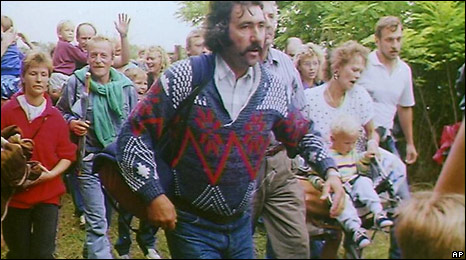
1 May
1851 London, Culture: The Great Exhibition opened in the purpose built Crystal Palace, a giant glass-and-iron hall. There were 14,000 exhibits covering eight miles of tables over nearly a million square feet. Many of the displays were new technologies of the time, including false teeth. But the Crystal Palace itself was the centrepiece. After the six months of the Exhibition it was moved to Sydneham and substantially rebuilt, bankrupting the consortium that owned it. There was no money for upkeep and the iron rusted, and the glass was pitted by pollution, dirtied, and cracked. In 1936 it was ravaged by fire. While arson was suspected no charges arose, and the building was so under-insured it could be neither repaired nor re-built. It was the first World’s Fair and another soon followed in 1853 in New York City.
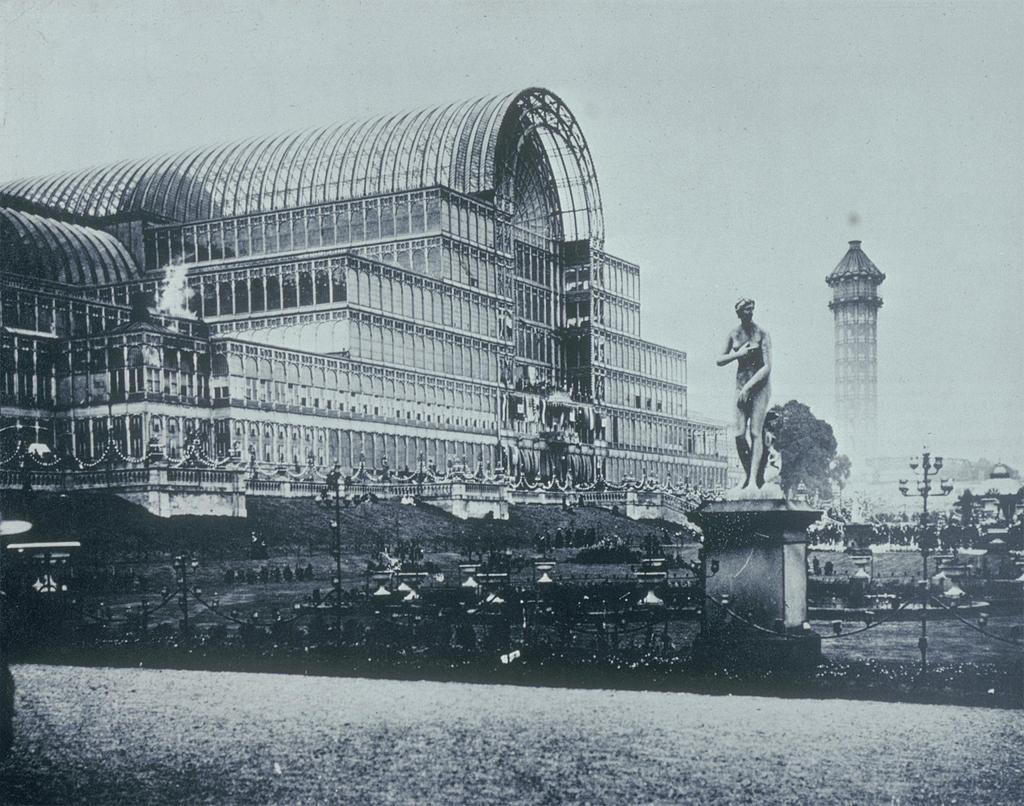
1886 Paris, Labour: May first has long been the first day of spring in the Northern Hemisphere. After the Haymarket Strike and Massacre, a gathering of international labour leaders called for a day of remembrance and to continue to campaign for an eight-hour day of work. 1 May became Labour Day. Over time the name has been changed and changed back and in some jurisdictions the date has been shifted to September, but it started in Chicago and was christened in Paris. The Labour Day parade shown below was in Brizzy a few years ago.
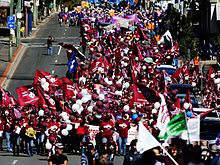
1926 Dearborn (MI), Industry: The Ford Motor Corporation adopted the forty hour week for its employees. It the first major corporation to do so. See the entry for 1886 above for some context.
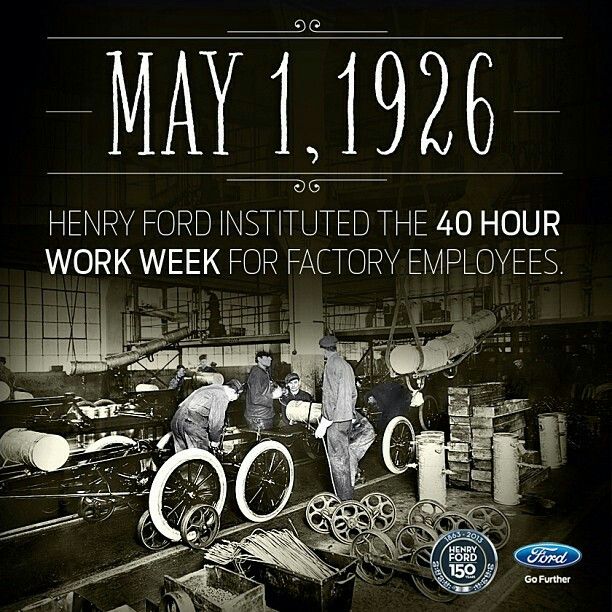
1931 New York City, Architecture: The Empire State Building was dedicated by President Herbert Hoover who pressed a switch in his White House office to turn the lights on in New York City. The consortium lead by John D Rockefeller which funded it did so in part to show confidence in the economic recovery of New York City. The entire building went up in just over a year, under budget and well ahead of schedule. During certain periods of building, the frame grew an astonishing four-and-a-half stories a week.
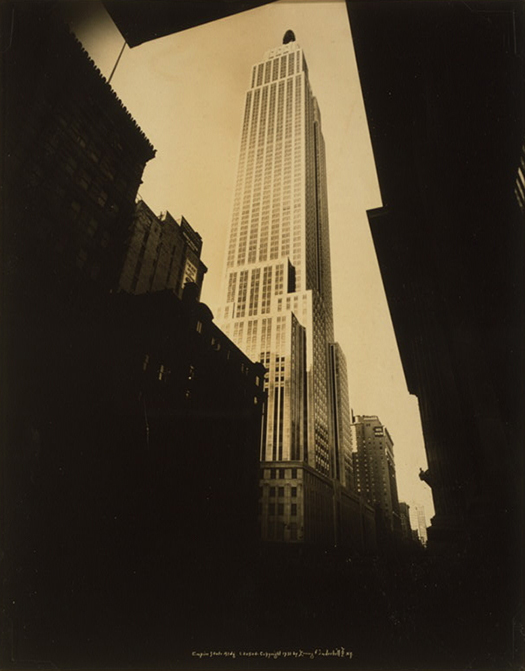
1941 New York City, Cinema: In the RKO Palace Theatre Citizen Kane premiered. The Hearst Empire — think Murdoch — attacked the film for its portrayal of a thinly disguised megalomaniac named William Randolph Hearst long before its release so that the Radio City Music Hall refused to screen it fearing commercial reprisals, relegating it to a smaller, more out of the way theatre but adding to the publicity.
